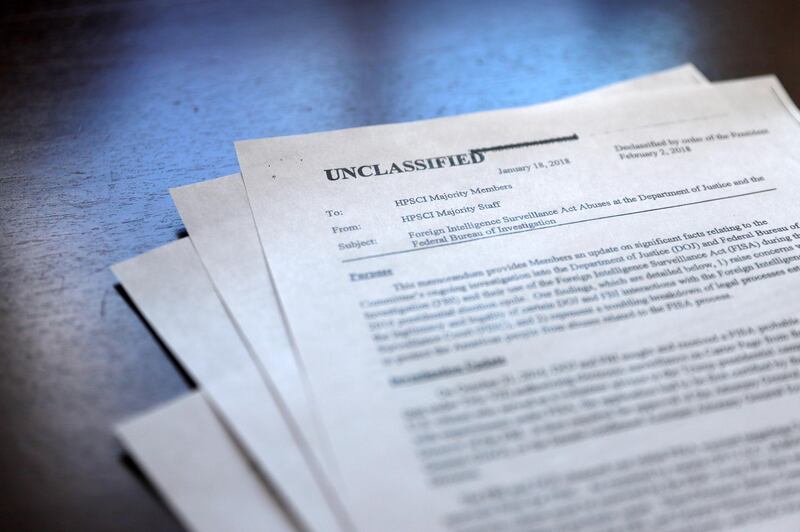In the past year the Republican establishment has come to terms with Donald Trump, who essentially conducted a hostile takeover of their party during the presidential primaries. As in any marriage, this couple has changed each other considerably during their cohabitation.
It's hard to overstate how fused they have become, as demonstrated by many Republican lawmakers joining the president in a vicious and bizarre war against his own FBI and Department of Justice.
This week House Republicans breached all tradition and propriety regarding handling classified information by releasing a memo from Intelligence Committee Chairman Devin Nunes. It accuses the FBI of deliberate wrongdoing in seeking a surveillance court order for one of Mr Trump's former foreign policy advisers, Carter Page.
This comically inept, self-refuting, document is clearly intended to confuse public opinion by throwing grave-sounding, but spurious, charges at the investigators themselves, "policing the police". They probably also hope to give the president an excuse to sack Deputy Attorney General Rod Rosenstein, a dynamic I explained on these pages in July, and replace him with a subservient successor willing to fire special counsel Robert Mueller and terminate the Russia-Trump campaign investigation.
However, the memo undercuts its own, and many of Mr Trump's, most important claims.
It confirms, for the first time, that the investigation of the Trump campaign originated neither with a controversial "dossier" of unverified opposition research financed by Democrats, nor anything to do with Mr Page, but with credible allegations about statements by another Trump campaign adviser, George Papadopoulos. And Mr Page, who US law enforcement had long considered a potential Russian agent, had already left the Trump campaign by the time the court order was secured.
Thus, two key conspiratorial claims - that the supposedly left-wing FBI sought to harm the Trump campaign and misrepresented biased information to gain a court order to spy on one of its operatives (Mr Page) - collapse. And this is without anyone having seen either the actual court order application or a rebuttal by House Democrats the Republican majority would not allow to be publicised.
It starkly demonstrates how much credibility congressional Republicans are willing to sacrifice for Mr Trump.
While he does not care much about most policy issues, on several fronts Mr Trump has shifted to conform with traditional Republican positions. The economic populism of his campaign has totally evaporated now that he's in office. The recent tax bill, the benefits of which will, at first largely and eventually almost exclusively, be enjoyed by only the wealthiest Americans, reflected zero concern for the middle or working classes.
These Americans might have benefited from a $1 trillion infrastructure spending programme Mr Trump advocated during the campaign, and still mentions. But it's hard to imagine the Republicans in Congress approving such massive spending, particularly since their aforementioned tax bill will raise the budget deficit by about $1.5 trillion in the next 10 years.
________________________
Read more from Opinion
[ In awards season, look to Hollywood to understand modern America ]
________________________
Still, Mr Trump has succeeded in shifting most Republican leaders on several of his core issues. Most Republicans have traditionally been sympathetic to immigration and free trade. No longer.
Hostility to immigration was the hallmark of Mr Trump's presidential campaign, and was combined with chauvinism, nativism and the unmistakable taint of white nationalism. Now most Republican leaders seem to have abandoned their traditional pro-immigrant stance and, without adopting Mr Trump's ethnic and racial hostilities, embraced his policy agenda of restricting legal immigration and cracking down on undocumented migrants. They have even cooperated with his seizure of 700,000 undocumented migrants brought to the United States as children as de facto hostages in the immigration and budget battles with the Democrats.
Mr Trump hasn't won them over completely on trade, but Republicans are adopting a much more sceptical attitude. For now, the understanding between them appears to be that those agreements that have not yet been implemented, such as the Paris climate accord and the Trans-Pacific Partnership can and should be abandoned. Nonetheless, most congressional Republicans remain supportive of existing trade agreements Mr Trump has threatened to scrap, such as the North American Free Trade Agreement and the US-Korea Free Trade Agreement.
We are only a year into the complex and tense pas de deux ballet between the insurgent populist and establishment conservatives. Which prevails on trade, particularly regarding well-established agreements, will strongly indicate the long-term balance of power and influence.
The widest gap between them, though, cuts to the very heart of the Nunes memo and the Mueller investigation: Russia.
Unlike the president, most Republicans remain deeply sceptical of Moscow, as does almost all of Mr Trump's own cabinet.
That many key Republicans are nonetheless willing to engage in open warfare, with the once-hallowed FBI no less, over an investigation into Russian covert operations to defend Mr Trump, without even knowing what he may be hiding, demonstrates how joined at the hip these unlikely Siamese twins have become.
If the Republican Party can survive the Trump era intact, hardly a certainty, another three, let alone seven, years will surely leave it unrecognisable from the party of traditional American conservatism. In many ways, it already is.
Hussein Ibish is a senior resident scholar at the Arab Gulf States Institute in Washington, DC





